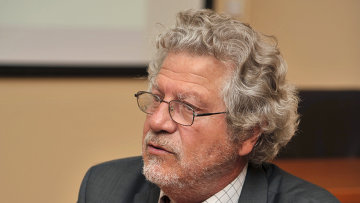Innovation Policy of the Russian Federation: Priority Tasks and Crucial Tradeoffs
In the framework of an open panel session of the Expert Group № 5 Jean Guinet has presented the report «Innovation Policy of the Russian Federation: Priority Tasks and Crucial Tradeoffs».

On June 10 an open panel session of the Expert Group № 5 «Transition to Innovation-based Growth» on reviewing the Strategy of the long-term social and economic development of Russia till the year 2020 took place at HSE. Jean Guinet, Head of the Research Laboratory for Science and Technology Studies, HSE Institute of Statistical Studies and Economics of Knowledge, presented report «Innovation Policy of the Russian Federation: Priority Tasks and Crucial Tradeoffs».
Jean Guinet is an internationally renowned expert whose main interests are focused on contribution of technological change and innovation to economic performance, and monitoring and assessment of science, technology and innovation policy of OECD member and selected non-member countries. Till November 2010 he was Head of Country Studies and Outlook Division (CSO), Directorate for Science Technology and Industry (DSTI), OECD.
Opening his speech, Jean Guinet noted that during the last decade Russia has gradually exhausted the possibilities of a relatively easy fast “recovery growth”. Keeping a low rate of investment and innovation Russian growth performance has consequently become more dependent on transitory factors, especially high world prices of oil and gas. The crisis and its aftermath have highlighted the extent to which Russia remains dependent on export of hydrocarbons. The ensuing recovery policy did not set a task to diminish the dependence. “To achieve a long-term sustainable growth, Russia needs to boost rapid productivity growth. This is a strategic imperative that will allow to radically expand opportunities to exploit the huge innovation potential of the country» - Jean Guinet said.The speaker noted that one shouldn’t try to find a panacea to resolve every problem. The outdated industrial policy aimed at preferential support of any «domestic producer» should be abandoned. It is inappropriate to scatter resources on supporting all that can be called «novelty». Nor giving out privileges to sponsors of innovation is an optimal way, Jean Guinet assured.
Overcoming these circumstances is seen by Jean Guinet, above all, in creation of an effective innovation strategy. That requires coherent vision of the future and the ambition to achieve it through the effective coordination of many policies. An effort is needed to channel creativity towards socially useful purposes by reconciling diverse stakeholders’ expectations. Innovation “landscape” is rapidly changing, so Russia shall act quickly in order to timely occupy promising market niches.
Furthermore, a long term investment strategy, involving both the public and private sector is necessary. An inclusive approach, promoting value-creating change throughout economy and society is extremely important.
The main Russia’s advantages, according to Jean Guinet, lie in generous endowment of natural resources and huge accumulated intellectual capital; high level of education of the population and employment in S&T; long-standing scientific and engineering culture; availability of world-class centers of excellence with high international standing in key S&T fields. Sufficient impetuses are the government’s commitment to the modernization and innovation agenda, and ability to mobilize resources in priority areas. As a result we see an increasing number of companies capable of seizing new market opportunities through innovation.
Among main constraints the speaker highlighted a low rate of investment and numerous disincentives in the business environment, notably the lack of competition, rent-seeking behavior and corruption.
According to the expert the task number one is the rapid expansion of Russia's innovation sector through increasing the number of small private innovative firms and networks. Currently Russia is characterized by a very high rate of publicly funded corporate R&D, while elsewhere they are funded largely by the private sector. As a solution Jean Guinet recommends more conducive framework conditions, new public R&D funding model, аnd more fully fledged entrepreneurship policy.
Commenting the current situation in Russia, Jean Guinet also noted the growing role of universities in research which although continue to be dominated by conventional research institutes. Medium-term objective consists in doubling the share of public research performed by universities. More than half of this research must be performed as joint projects of universities and RAS research units, and be supported by grant funding.
Photo by Alex Redechkin
